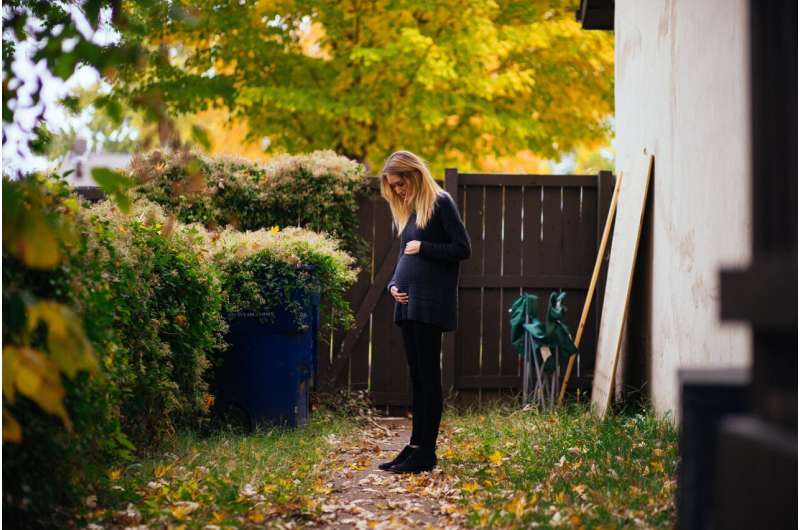This article has been reviewed according to Science X's editorial process and policies. Editors have highlighted the following attributes while ensuring the content's credibility:
fact-checked
peer-reviewed publication
trusted source
proofread
Student investigates link between neighborhood safety and pregnancy outcomes

Pregnant people who report feeling unsafe in their neighborhood are more likely to experience depression during pregnancy and have a baby with a low birth weight, according to a study published in JAMA Network Open.
Julia Carter, a fourth-year medical student at Feinberg and first author of the paper, said the study aimed to understand the connection between perceived safety and pregnancy outcomes.
"There have been several studies about the association between neighborhood crime and adverse pregnancy outcomes, but very little on this more subjective concept of perceived neighborhood safety," Carter said. "That's what we wanted to explore: to see how one's perception of safety, which is a different concept than actual reported neighborhood crime, could influence their own health. Poor neighborhood perception may influence health outcomes through a direct biological pathway by increasing levels of maternal stress, which is well-known to impact pregnancy outcomes."
In the study, nearly 30,000 pregnant people from eight different states in the U.S. who participated in the CDC's Pregnancy Risk Assessment Monitoring System (PRAMS) were asked about the perceived safety of their neighborhood. Roughly 78% reported they never felt unsafe in their neighborhood, 14% said they rarely felt unsafe, 5% sometimes felt unsafe and 3% always or often felt unsafe.
After controlling for individual demographic and clinical risk factors including exposure to interpersonal physical and emotional abuse, those who reported always or often feeling unsafe were two times more likely to experience depression during pregnancy, 23% more likely to have a baby with a low birth weight and 10 percent less likely to attend more than eight prenatal care visits, according to the study. Perceived neighborhood safety was not associated with postpartum visit attendance or breastfeeding.
The findings highlight the influences of individual- and community-level social determinants of health, Carter said.
"This study has a zoomed-in, specific focus on perceived neighborhood safety and pregnancy outcomes, but our findings are relevant to a broader scope of social determinants of health in general," Carter said. "Addressing these issues must take place beyond the clinic and the hospital. It's really important to recognize these factors that could be playing a role in the patient's health."
For Carter, the findings are also a reminder that physicians need to discuss these difficult topics with patients.
"There are many screening tools out there for interpersonal violence and domestic violence that are important to keep in mind while working with patients," Carter said. "Although these are sensitive topics, it's necessary to address them with patients because these are topics patients want to talk about, but it's hard for them to bring up."
Future work is still needed to see what interventions would be helpful in addressing these disparities, said Lynn Yee, MD, MPH, the Thomas J. Watkins Memorial Professor of Obstetrics and Gynecology and senior author of the study.
"Our team was struck by these findings, particularly the relationship of low perceived neighborhood safety to the significantly increased risk of perinatal depression. We know there is a maternal mental health crisis in the U.S., and our work speaks to the importance of not just addressing mental health in the clinic and via direct patient care, but by developing interventions on a community and societal level, too," Yee said.
"The growing body of literature on adverse community and neighborhood social determinants of health, such as neighborhood safety, represents a call to action—we need social policies that better support the health of pregnant people and their families."
More information: Julia G. Carter et al, Perception of Neighborhood Safety and Maternal and Neonatal Health Outcomes, JAMA Network Open (2023). DOI: 10.1001/jamanetworkopen.2023.17153



















